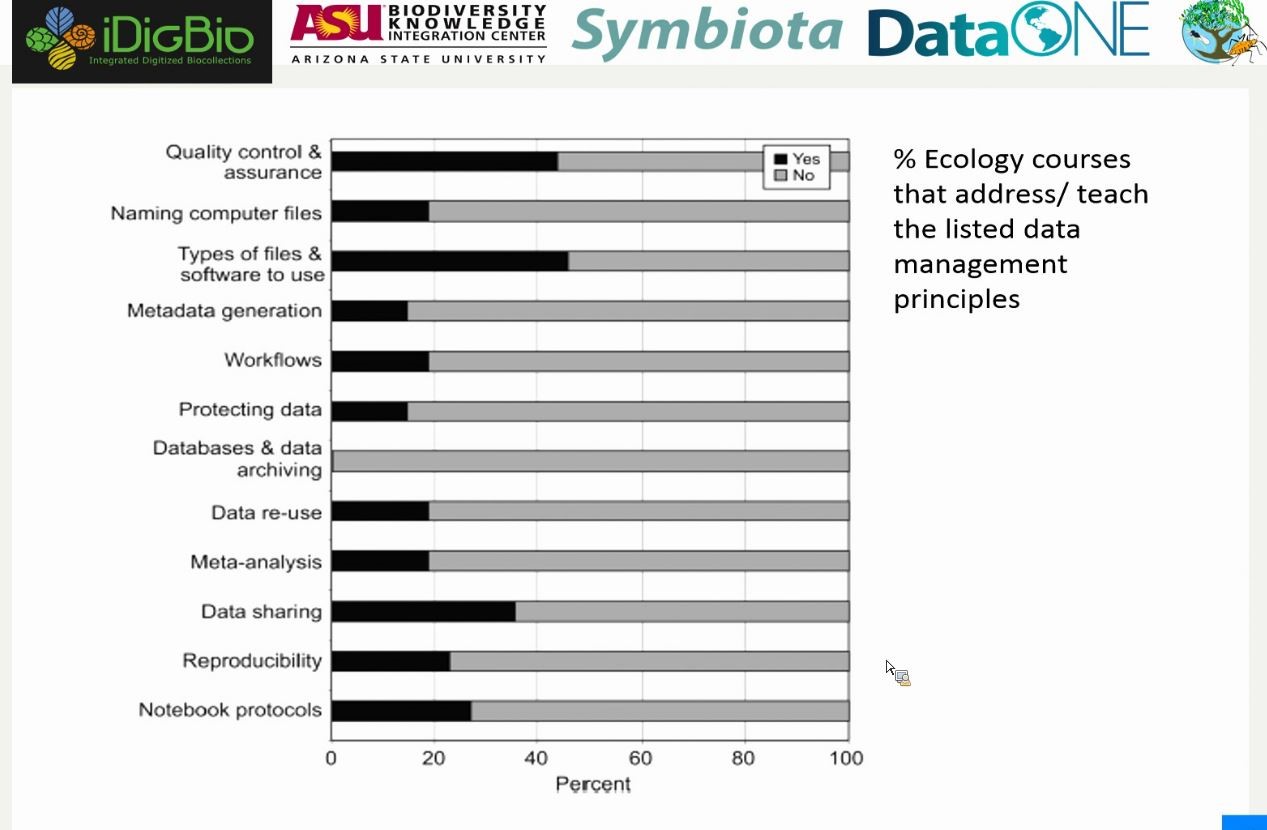from Deb Paul @iDigBio
Thirty-one folks from all over the USA just spent 3 biodiversity-informatics-information-filled days at Arizona State University (ASU) for the iDigBio Workshop: Managing NHC Data for Global Discoverability. Head over to Facebook for more Views from the Workshop.
Nico Franz, Director of the ASU Biodiversity Knowledge Integration Center (BioKIC) at ASU, supplied extra funding that made it possible for us to have a 3-day (instead of 2-day) workshop. All the participants will tell you they needed 3 days and we packed a lot of information into the time allotted. Thank you Nico, and ASU. The well-designed workshop space nicely accomodated 39 of us - and everyone had a good view! We all enjoyed the walls-we-could-write-on!
Workshop Wiki. http://tinyurl.com/nhcdata
Our audience.
Some people in the collections community wear multiple hats, so these numbers don’t add up to 31, but when asked to self-identify as 1) researcher, 2) collection manager, 3) data manager, we had 16, 26, 20, respectively.
Highlights.
Fourth in-a-series of biodiversity informatics workshops, the material covered combined digitization specifics such as how to choose collection management software, with biodiversity informatics skills and knowledge needed to give collections data a longer life through the robust use of appropriate standards and sharing strategies.
 For example, participants learned about the world of data re/use and data management planning from Amber Budden from DataONE. One of her most compelling slides, shows the need for the kind of information presented in this workshop...
For example, participants learned about the world of data re/use and data management planning from Amber Budden from DataONE. One of her most compelling slides, shows the need for the kind of information presented in this workshop...
If you use a spreadsheet to manage data and sometimes find yourself wishing you knew a bit more about how to manipulate data in a spreadsheet, you’ll want to check out one of the course sections on better spreadsheet skills. You can walk through the same course materials as the participants.
Our workshop participants enjoyed two remote presentations. Anne Thessen (http://datadetektiv.com), presented Data Publishing: in the context of the data life cycle. David Bloom (from VertNet.org) demystified the timely and sometimes confusing topics of Copyright and Intellectual Property Rights (IPR) and encouraged all of us to support the adoption of community norms.
Some other compelling topics covered in this workshop included:
-
more on data cleaning and potential tools to make this task easier and more efficient
-
a hands-on experience with the GBIF IPT tool that makes NHC data-sharing easier
-
how to map data to a standard
You can find out more, and see the materials for yourself (and hear the recordings) on the workshop wiki.
Compliments of ASU, we all enjoyed a lovely trip to the Desert Botanic Gardens. You can see the photos on Facebook, see a few colleagues, friends, and perhaps an interesting species or two other than Homo sapiens sapiens.
Thoughts.
We are eagerly awaiting the post-workshop survey results and thinking about future workshops, webinars, and materials. From workshop conversations, several participants shared that this was “just what they needed, just when they needed it” which of course, is wonderful to hear. The workshop team is pleased to know that the materials and skills being taught seem to be filling a need in the community - and that these skills, and knowledge in turn, support better digitization. That is, digitization and in-turn, better data, are supported by enhanced community knowledge of data standards, sharing protocols, data standardization tools, and increased knowledge of where to find help. We also believe that this increased knowledge supports better communication in the future in collaborative efforts between Information Technology staff, researchers, collection and data managers, and students.
Footnote.
This workshop is the fourth in a series of four biodiversity informatics workshops, collaboratively developed by the broader scientific and research community. For this workshop, several projects contributed staff expertise to content development and delivery including the Tri-Trophic TCN, DataONE, Symbiota, ASU (BioKIC), NCEAS, and iDigBio.
You can check out the first three from the following links.







